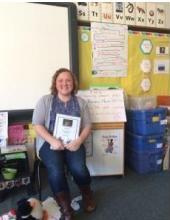
Minneapolis Public Schools Q-Comp Professional Pay Newsletter, April 2016
Tiffany Renando has made huge gains in reading with her first-graders at Bancroft this school year. Sixty-nine percent of her students were reading below grade level at the beginning of the school year, with many knowing very few Fry sight words in September.
Tiffany notes that Fry’s sight words are words that occur frequently in text. The first 10 sight words make up 24 percent of all written material and the first 100 make up 50 percent of all written material. Tiffany wanted to ensure that her students had a solid foundation in understanding of these sight words, which are the basis for reading comprehension for years to come.
The strategies that she was using at the beginning of the school year, like memorization, repetitive practice, or movement and pictures, weren’t helping her kids in their reading comprehension as she had hoped. She also notes that there is no curriculum for teaching sight words at MPS and this is what her students needed support with.
Motivated by a desire to help her kids increase their reading comprehension, Tiffany tapped into her students’ interests.
“My kids like singing and I wanted to see how I could make it academic,” she said. So she signed up for the ProPay course, “Want to Teach Reading and Math? Try Singing!” This course provides teachers with strategies to cross-train the brain to raise achievement in reading and math through singing, playing games and using the Affirming Parallel Concepts (APC) strategy. Tiffany used the course strategies to specifically target and increase sight word comprehension. Tiffany notes that APC is a strategy for students to practice musicality alongside an academic skill that would typically need to be memorized and has shown improved literacy skills in children.
With the learning from her ProPay course, she started implementing singing into her lessons. After introducing new sight words, Tiffany uses various folksongs to provide her students an opportunity to practice the new words to help solidify their understanding. “Singing is now used to practice concepts that are usually memorized.”
With these strategies, “reading levels took off,” Tiffany said. By November, only 23 percent of students were below grade level. And now in April, “most students are at or above grade level. The only difference between this year and last year was the singing.”
She notes that the course “helped as a new teacher” and “helped me focus my data and use that information to target specific things for my students.” Additionally, the course “aided in lesson planning.”
ProPay, and the singing course specifically, “lends itself to really being applicable to the classroom. If I could take it again, I would!”